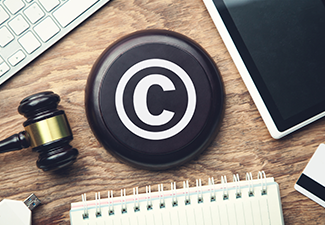4 Factors That Determine Whether a Copyright Was Infringed
July 31, 2023
 Copyright law gives copyright holders certain exclusive rights over their works and creations. When you are a copyright holder, others cannot use your works unless they have your permission, or the use qualifies as “fair use” under the law.
Copyright law gives copyright holders certain exclusive rights over their works and creations. When you are a copyright holder, others cannot use your works unless they have your permission, or the use qualifies as “fair use” under the law.
Those who do not understand the four factors that determine whether a copyright was infringed may not be able to make a distinction between fair use and copyright infringement. If you suspect that your copyright has been infringed, you might want to speak with an attorney.
At the Law Office of Julie Scott LLC, I represent people who need to protect their copyrighted work and enforce their rights. I help clients navigate the legal complexities of copyright law and ensure that no one else is using their work without permission. I have an office in Kansas City, Missouri, but also serve the surrounding areas, including Rolla, Columbia, and Springfield.
Measuring Fair Use
Since “fair use” is a defense often used in copyright infringement cases, you need to understand what constitutes fair use and how it is measured. In order to measure fair use, there are four factors that determine whether a copyright was infringed.
1. The Character and Purpose of the Use
First and foremost, it should be determined how the copyrighted work is being used. Is it for commercial or non-profit educational purposes? Copyright law encourages research, education, and scholarship, which is why non-profit use of copyrighted works may not be considered infringement.
For example, copying a painting for educational purposes would most likely be considered fair use, while copying a painting to use it as an advertisement for a commercial product would be copyright infringement. In addition, courts also consider whether the use of copyrighted material is transformative. In other words, if it adds a new meaning or message to the original material, it may be transformative.
2. The Nature of the Copyrighted Work
Depending on the characteristics and attributes of the copyrighted work, courts may allow for a wider scope of fair use. The court will have to determine whether the copied material is informational or entertaining in nature. Fair use applies more broadly to factual work (e.g., a biography), rather than fiction (e.g., a novel). As a rule of thumb, courts tend to be more protective of creative works such as music, poetry, and art compared to nonfiction works.
3. The Amount of the Copyrighted Work Used
While copyright law does not set any “acceptable” amounts for using copyrighted works, there is a general rule that applies to copyright infringement cases: The more of the copyrighted work is used, the less likely it is that the “fair use” argument will be accepted by the court. Typically, the amount used is measured relative to the size or length of the original copyrighted work.
4. The Effect of the Use on the Copyrighted Work’s Market
The fourth factor is usually more complicated than the other three. This factor requires an investigation of the market to determine whether the copyrighted work is reasonably available for purchase/licensing by others. In other words, if the infringing party can prove that they could have purchased/licensed your copyrighted work, they are more likely to prevail on the “fair use” argument. Overall, this factor is used to determine whether using copyrighted work hurts the market for the original work.
What to Do When Your Copyright Was Infringed
There are a number of legal remedies available if your copyright was infringed. The first step to take before suing the infringing party is to speak with an attorney who has experience in copyright infringement cases. The attorney will advise you on your best course of action based on the facts of your case.
If the other party is trying to use the “fair use” defense, your attorney will evaluate the above-mentioned four factors to determine whether the defense has any merits. Your attorney will also help you gather evidence to prove that your copyrighted work was used without your permission to file a complaint with the U.S. Copyright Office. However, before filing the complaint, your attorney will help you draft a cease-and-desist letter to:
Make the infringing party stop using your copyrighted work; and
Prohibit the infringing party from using your copyrighted work in the future.
While it is not mandatory to draft a cease-and-desist letter, doing so will alert the infringing party that you are aware of the alleged infringement and that legal action will ensue if they do not stop. If the infringing party continues to use your copyrighted work after receiving the cease-and-desist letter, you may need to consider filing a lawsuit to make them stop and obtain monetary damages.
Helping You Understand Your Rights Surrounding Copyright Infringements
If you are a copyright holder, you need to diligently enforce your rights and ensure that no one is using your copyrighted work without your permission. If you think your copyright was infringed, I can help you understand the legal remedies available to you. Contact the Law Office of Julie Scott LLC to schedule a free consultation and discuss your best course of action when dealing with copyright infringement.